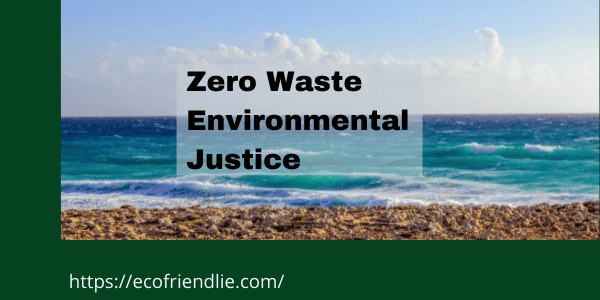Zero Waste Movement and Environmental Justice
The zero-waste movement and environmental justice are inextricably linked and extraordinarily robust. Whilst it can not come as a surprise that privilege tends to create risky surroundings for the ones without it, the results of that dynamic are nowadays greater severe than ever. However, because the window for resolving the environmental catastrophe closes and social fault strains deepen and grow to be more visible, we’re given the opportunity to do important corrective work.
To accomplish that, we must first recognize how the domains of ZERO waste and environmental justice join, permitting us to harness their synergy to have an effect on systemic alternatives. To that aim, this post will have a look at what environmental justice is, how our manufacturing structures (especially our courting with trash) perpetuate it, and the way we may also develop intersectional solutions to both.

What is Environmental Justice?
The Department of Energy defines Environmental Justice as:
Fair remedy and significant participation of each person in the established order, implementation, and enforcement of environmental legal guidelines, policies, and guidelines. Irrespective of race, color, national foundation, or earnings. Truthful remedy refers back to the fact that no institution bears a disproportionate part of the negative environmental repercussions of business, municipal, and business operations. In addition to the implementation of federal, country, and nearby laws, rules, and policies. Meaningful participation necessitates regularly occurring get admission to decision-makers and the capacity for all groups to make informed selections and take proactive moves to reap environmental justice.
The maximum critical point is that environmental justice is primarily based on meaningful political participation by means of all and sundry and that no organization is disproportionately deprived through an unwell environment created with the aid of human movement.
While environmental justice is a vital aim, we nonetheless have an extended manner to go before it will become a fact. The poorest communities in the U.S.A and around the arena go through the maximum, with Black, Indigenous, and people of shade businesses being disproportionately affected (BIPOC).
Furthermore, the dangerous outcomes of man-made environmental occasions on groups are often the outcome of planned political disenfranchisement. As a result, we are not now experiencing a technology of environmental justice.
What Role does Waste Play in Environmental Justice?
Much of the environmental degradation that has been witnessed around the world can be traced back to our fabric economic system and, as an end result, our connections with manufacturing and waste. Our customer economy has widespread environmental charges, from the extraction of uncooked materials from the ground to their processing into objects, distribution, intake, and next waste. In the Story of Stuff, the damaging impact of our cloth financial system on the environment is well explained.
Land ought to be continually destroyed, and garbage should be continually disposed of somewhere, a number of the numerous reasons that permit this gadget to work because it does. Because of the extreme environmental repercussions of these processes, corporations with political or economic clout will do the whole thing feasible to save them from taking areas near them. As an end result, these processes and the facilities that go along with them tend to be created closest to the businesses that have the least political influence. As an end result, environmental injustice allows and later exacerbates socioeconomic imbalances (which can be often produced with the aid of social injustice).
Consistent with the Environmental strength take a look at the Institute, “EJ” or “environmental justice” neighborhoods are domestic to 79% of municipal solid waste incinerators and the majority of landfills. Dwelling close to those centers carries a number of health risks, consisting of a multiplied danger of asthma, respiration ailment, and cardiovascular sickness.
Similarly, incinerators are the largest global producer of dioxin, the maximum dangerous guy-of man-made material we are aware of. Landfills can pose a hazard to the environment by liberating infected water and different dangerous drinks into the environment, that may penetrate and damage close soil and waterways. While landfills and incinerators are blended, communities are left with hazardous soil, air, and water.
Because no person wants an incinerator in their region because of the fitness risks, garbage companies often are looking for cities with the least political or monetary power to oppose them.
The ones wallet of danger were generated by way of historic and ongoing discriminatory processes including redlining. It’s far frequently the populations who have been most discriminated in opposition to, and who stay in that wallet, that land up living in near proximity to harmful facilities.
The political vulnerability produced by means of racial exercise and regulation has allowed for non-stop exploitation within the material economy. That is why the general public of EJ communities in the US are also BIPOC communities.
EJ groups get up and are perpetuated as a result of a combination of unhealthy manufacturing techniques and institutional discrimination, highlighting the intersection of environmental justice and the zero-waste movement.
But, the exploitation of the politically and economically disenfranchised isn’t always limited to countrywide borders. It’s far felt on an international scale as well. Powerful economies, which include the united states, which consumes 30% of the world’s sources and generates 30% of the arena’s trash, should are looking beyond their borders to fulfill the needs of their cutting-edge delivery chains. Land and labor are invariably exploited by the events with the least strength for you to provide the bottom solutions for powerful international locations and companies.
How can Zero Waste Support Environmental Justice?
The zero-waste movement has the capability to assist attain environmental justice in a big manner.
For starters, it is able to relieve strain on EJ communities properly away. We will do away with the strategies that purpose awful environmental instances via implementing zero-waste standards on an international scale. As an instance, cradle-to-cradle questioning relieves strain on the ecosystems wherein new raw substances are extracted and disposed of. Therefore enhancing the dwelling conditions of folks that live there and assuaging the symptoms of environmental injustice.
Second, the zero-waste movement has the ability to help EJ groups flourish independently. To make zero waste work, we need to construct greater tightly connected neighborhood economies that can be better able to take advantage of and circulate the herbal and human resources that they have at their disposal. We will guide the conditions inside EJ communities for them to develop local economies, benefit from monetary and political strength, and deal with the conditions that permit environmental injustice by shifting closer to zero waste.
We want to place stress on governments and manufacturers to make this a fact. We ought to ensure that zero-waste legislation is enacted in any respect tiers of government, and that producers are held answerable for their waste at every degree of manufacturing via extended producer responsibility. We additionally need to guide anti-racist tasks and rules that serve to undo the harm finished via racist practices like redlining and build lengthy-time period resilience in opposition to new sorts of social and environmental injustice.
Zero Waste can Support Environmental Justice Closer to Home
Searching toward home, the primary and maximum fundamental issue we can take is to retain our personal zero-waste trips and encourage others to do the equal. This may help reduce the quantity of waste despatched to landfills or incineration while additionally decreasing the call for new gadgets farther upstream inside the production system.
But, the nice impact of our zero-waste trips may be amplified with the aid of purchasing from EJ communities wherein feasible and supporting grassroots pastime. While government funding in EJ areas is crucial, the simplest manner to cope with environmental and social injustice is to assist communities in their own improvement efforts. As an end result, doing what we will help and maintain self-directed resilience within EJ communities includes doing what we will nurture neighborhood groups, neighborhood environmental employees, and local zero-waste networks.
We want to assemble parallel structures closer to which we are able to transition if we want to move away from our cutting-edge unfavorable business methods, and zero waste is an excellent instance of this type of system.
Test out the zero waste weblog for additional records on a way to achieve zero waste in your house, network, or commercial enterprise, or analyze more about the Zero Waste International Alliance’s efforts.
Zero Waste Future, Not Dumping & Burning
Eco friendly and Zero waste movement include all of the following strategies:
- Safe, non-toxic, and reusable products and technologies
- Comprehensive recycling, reducing consumption and discard
- Extended producer responsibility
- Comprehensive composting or bio-digestion of organic materials
- Ban waste incineration, and stop dumping on vulnerable communities.
- Safely Managing Toxic-containing Lights in Low-Income and Marginalized California Communities
Facts You Should Know
Burning trash has numerous adverse environmental, social, and fitness results.
Conventional “mass burn” incinerators, in addition to the brand new era of two-staged incinerators dubbed “incinerators in disguise.” Because they use plasma arc, pyrolysis, and gasification technology, all emit a huge variety of pollutants into the air and act as a deterrent to recycling and other “zero waste” pollution prevention efforts.
Waste incinerators do all of the following:
- Poison our environment, bodies, and food supply with toxic chemicals.
- Produce toxic byproducts.
- Undermine waste prevention and recycling.
- Contribute to global climate change.
- Waste energy and destroy vast quantities of resources.
- Drain money from local economies to pay for expensive, imported technology, and provide far fewer jobs than zero waste programs.
- Hide the evidence of dirty and unsustainable industries.
- Violate the principles of environmental justice.
Better options exist for incinerating materials, and incinerators have been defeated in many towns in which humans have banded collectively to form robust grassroots organizations. Maximum items can and ought to be recycled or reused in a safe and cost-effective manner, and we also want to use less and adapt our products to be toxic-free and long-lasting. That is at the coronary heart of a zero-waste plan, which gets rid of the incinerator’s unfavorable environmental, social, and fitness outcomes.



